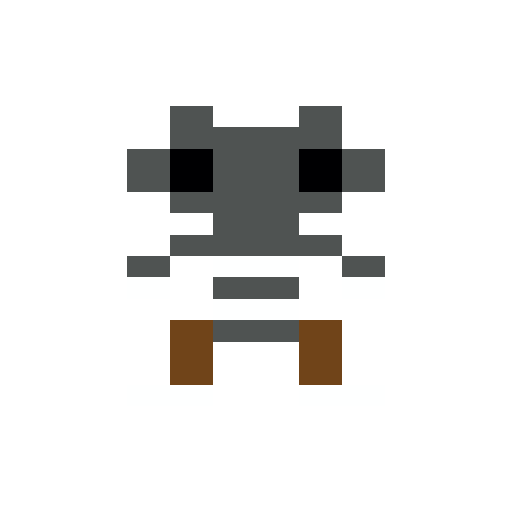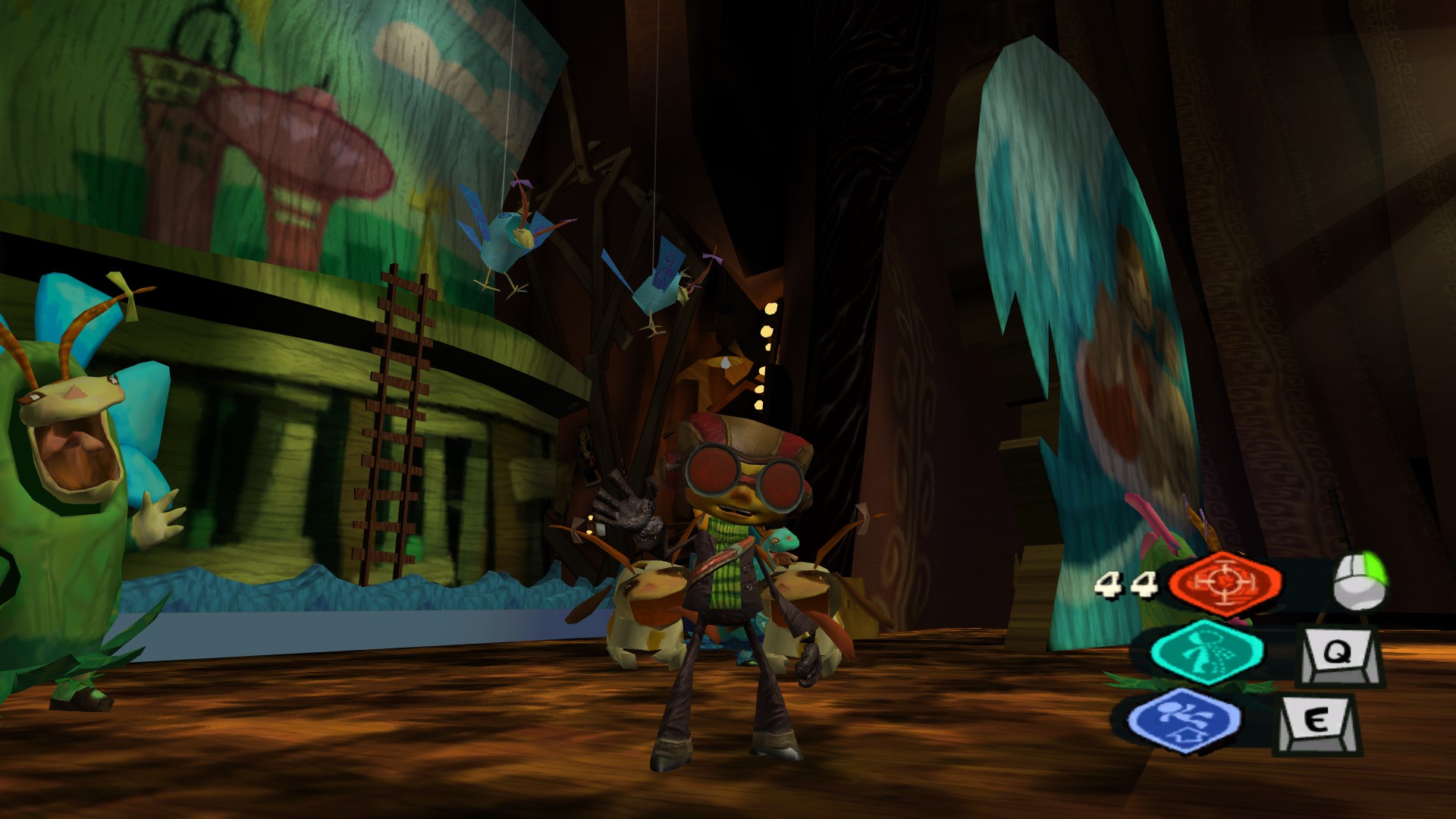I bought a small form factor pc recently to serve as HTPC (home theater pc, or pc wot plays media files) and allround home, web and cloud server. It has integrated graphics. It runs linux. It is in other words not a gaming pc. But I still went ahead and bought a controller with it, installed Steam and picked up a number of indie titles to run on it.
It has turned out surprisingly well. Due in large part to the fact that it has allowed me to reconnect with Double Fine’s 2006 cult classic Psychonauts. I liked Psychonauts before when I rushed through every level to get to the endgame. Now that I have played it at a more leisurely pace, I think that it might just be the best game that I have ever played in terms of world, environment and characters.
The reasoning is fairly simple. You may have heard people talk of games where the fate of the characters mattered to them, beyond merely tactical concerns. Maybe you have felt that way yourself. Me, not so much. Except, that is, for the summer camp of Whispering Rock that is the setting of Psychonauts and the collection of misfits that inhabit it.
I have never encountered an RPG character that I didn’t think of as just a human stick on which to pin a story. And while To The Moon did tug at my heart strings, that seemed to be more a function of the way the story was told combined with a haunting soundtrack than because the characters gripped me. I remember the two memory manipulators, their voices and their interplay – one warm and sweet, the other cynic and sarcastic – far better than the supposed central characters, the dying man and his dead lady love.
In Psychonauts I know the names of all the campers and their individual quirks. I eagerly hunt down any opportunity for a few more reaction barks from them just to fill out some more blanks. And I really, really want Dogen to be alright (No, he’s not just ‘like that’!). Even though the campers are mostly two-dimensional cartoon characters, these guys still have personalities, expressed beautifully in the art direction and the voice work.
Of course, the scope of the story is comic book material which means that character development isn’t particularly deep. Take J.T. (or James), the cowboy kid. At the beginning of the story, he’s Elka’s new fling, having displaced Nils in her affections (though clearly not completely). He is also Chops’ friend and musical partner, though his new relationship is taking him away from his buddy and his music. After having been de- and rebrained, the lesson J.T. takes away from it all is that he shouldn’t have neglected his friend for a “filly”. Another example: Mikhail is really just a Russian version of The Simpson’s Uter. He’s the foreign exchange student with a strange, stereotypic foreign obsession (chocolate and wrestling bears, respectively). But and that’s an important but: They have or develop meaningful relationships. Which fleshes them out as meaningful characters that we care about. This aspect is lost in a lot of comments and reviews. Try counting the ‘wacky’s, ‘insane’s and ‘crazy’s in this 2005 review from GameSpot (not to mention the ‘hysterical’s and ‘nutty’s). [Oh, and labelling Sasha Nein as of “indeterminate Eastern European” origin has to be the most culturally tonedeaf thing, I have ever heard. You can be forgiven for not recognizing the design of his Shooting Gallery and lab as inspired by the German Bauhaus movement. But his name is German – Nein means no – and his accent is German. The obsessive preoccupation with control is stereotypically German. And if you’re still unsure, the bloody signs on his complex are written in the German language. Ach, du lieber Gott.]
In fact we care enough to meaningfully motivate our quest to retrieve their brains. Even bullies Bobby’s and Benny’s and mean girls Kitty’s and Franke’s. Because we’re really doing it for them, not to stop Loboto’s and Oleander’s kidbrain-fuelled world domination scheme.
Even if they are somewhat formulaic, these simplistic character snippets work within the confines of a story and environment that is all about nostalgia for an innocent, simple pre-teen world. The camp of the early part of the game – bathed in the golden sunshine and bird tweeting of a seemingly endless summer – even makes me nostalgic for summer camps of yore. And I hated those things with a passion back in the day. And even though the overall tone is chipper and sunny, there are subtle hints of (non-comic booky) darkness in the troubling/creepy fanboi characters Clem Foote and Crystal Flowers.
I don’t think there is a formula for succesfully portraying outsiders. If there was, successful attempts would not be so rare. But there are things that will almost certainly ruin it. Pushing identification onto the player/viewer/reader is a sure fire way. Take XMEN 2, a movie I watched when I was a recently out young gay man, as a particularly blatant and atrocious example. Parents ask their kid if he/she/they could not just quit being an X-person and the kid explains that no, he/she/they is that way by default not by choice. ‘GET IT!? IT’S A HOMONALOGY!’, the movie is practically shouting at you, ‘THIS IS WHAT IT’S LIKE BEING GAY!’. Or having characters expositionize their outsider politics like in Sense8. Psychonauts leaves it to me to draw whatever analogies I want and identify with whomever I want. And works so much better for it.
Raz, himself, gets to go a bit further of course. His overarching narrative is of course, like Broken Age just with younger protagonists, a coming of age story. As the sun sets on Whispering Rock, Razputin (no longer just ‘Raz’) has to take on increasing responsibilities as the adults fade away. The dangers gets more real though they are of course still comic book sized dangers, like mind-manipulation and world domination schemes. And of course, the love interest angle with Lili develops. Like The Simpsons, South Park, and Calvin and Hobbes, Psychonauts allows it’s young protagonist an improbable amount of maturity, tact and human insight in some regards, while remaining a ten year old kid in others.
To avoid spoilers I won’t touch on the resolution of Raz’ story but suffice to say that it does feel a bit too swift and easy. But that is testament to the fact that the preceding hours spent in his company have built him up into a character that I feel for and inhabit.
One thing’s for sure. As summer comes to an end, I know I’m going to miss the gang from Whispering Rock.

